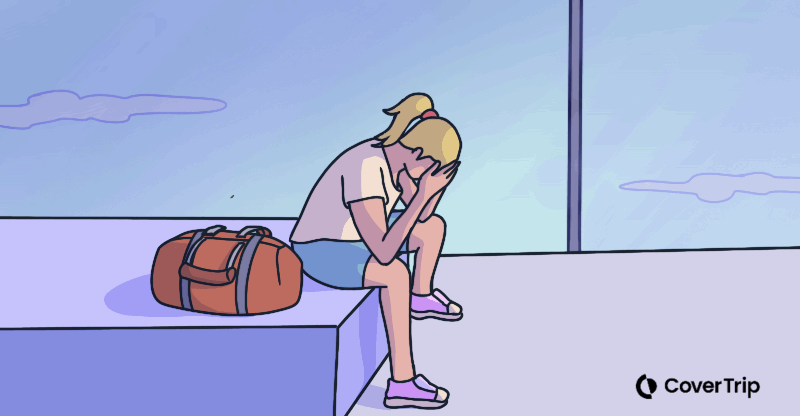Strategies to manage travel anxiety
30 June 2022
If you’ve been watching the latest travel news at all, you know that flight cancellations and delays, labor strikes, and pilot shortages are plaguing the travel industry.
Adding to the mess, airlines are announcing the end of service in cities where it’s no longer feasible (or possibly profitable) for them to fly. For an industry that down-sized significantly during the pandemic, the ramp-up to meet travel demand has not kept pace with the increasing number of travelers.
Airlines are getting inventive, but their creative measures may not sit well with all travelers:
- Allowing pilots with lower-level certificates operate aircraft with fewer seats
- Offering triple pay to pilots who are willing to pick up extra trips in July
For travelers who feel anxiety, leaving a well-stocked and familiar comfort zone to face everything that could go wrong (even on a short trip), can all feel like too much.
Even those travelers who don’t regularly feel anxious are reporting feeling discomfort, unease, and worry about their summer trips.
“Travel is simply the kind of thing that is prone to inducing anxiety, but travel anxiety is not a separate kind of anxiety — it’s an anxiety like anything else,” – Jaime Kurtz, Ph.D. and author of The Happy Traveler: Unpacking the Secrets of Better Vacations.
In that way, it’s helpful to step back and remember that anxiety — defined as an emotion characterized by feelings of tension, worried thoughts, and physical changes — is not necessarily a bad thing.
The tricky thing about travel is that there are a lot of situations that can cause anxiety overload. Here’s what you need to know to manage your travel anxiety.

Practice self-care strategies to address travel anxiety
When you start to feel anxious about a trip, practice self-care strategies recommended by psychologists:
- Pinpoint the exact cause of your travel anxiety,
- Identify the facts that are true right now, and
- Make a contingency plan
For example, instead of saying, “I feel anxious about my trip,” be more specific and name the exact concern. Once you know what the particular worry is, you can make a contingency plan to manage it.
Preparation and flexibility are the key to contingency plans
For travelers who want to navigate unpredictability, and keep from spiraling if things don’t work out as planned, preparation and flexibility are key.
Get pre-screened
It doesn’t hurt to be well-prepared. The TSA recently reported record-breaking numbers of travelers screened—the highest volume since before the pandemic!
To avoid mile-long security lines, you can enroll in programs like TSA PreCheck (for domestic flights), Global Entry, and Clear. Many travel credit cards offer repayment to cover the application fees.
Pro tip: If you’re tight on time before your next international trip, here’s the secret to getting Global Entry quickly.
Monitor the weather
Starting a few days before your flight, monitor the weather to see if it will affect your departure and arrival airports (or airports where you have stopovers).
If you know bad weather is coming, you can ask for an earlier flight. More and more airlines will allow travelers to change plans with no fare difference prior to severe weather. Some will even proactively change your flight for you.
If you want to adjust your flights to avoid bad weather, go to the airline’s website and look for an advisory notice. Alternatively, call them directly to see if you can reschedule. If the airline hasn’t issued an advisory, you may choose to pay out of pocket for a flight change just to avoid what’s likely to be a hassle.
Know what to do if your flight is canceled
With record numbers of flight cancellations, travelers are brushing up on the rules that apply when a flight is canceled.
The carrier’s contract says they will get you to the destination on your ticket, even if it’s on a different day.
See our previously published article: Top Strategies for Canceled Flights to know what exactly you can do in the moment.
Book your parking spot in advance
If you’re driving to the airport and leaving your car in the lot, pre-pay for your parking spot in advance.
Here’s why: travelers’ habits have changed since the pandemic. Some don’t want to take public transportation or use a ride-share out of fear of being exposed to the virus.
Yep, it’s weird since they’re going to sit in an airplane full of people from around the world. But, still true. So true that most airports are now warning travelers that the parking lots are full. If you have to park at the airport, you’ll want to pre-book your parking spot.
Each airport has their own website where you book parking before your trip. There are some advantages to this system too:
- You’ll be guaranteed a spot to leave your car, and
- You’ll save money since many airports offer discounts for pre-paying.
Prepare for flight delays
There’s nothing worse than being at the airport and not knowing your flight could be delayed. Here’s how to prepare for that contingency:
- Download your carrier’s mobile app before you leave so you can see real-time delays and cancellations and address the situation quickly.
- Bring plenty of entertainment and extra snacks, including water, so you’re comfy while waiting for the next flight.
Prepare for lost luggage
Not checking a bag is ideal, but sometimes easier said than done. If you have to check your bag:
- Attach a luggage tracking device before you hand it over, and
- Pack a change of clothes and toiletry kit in your carry-on.
Pro tip: if you’re headed to a place with a pool, stuff your swimsuits into your carry-on too. There’s nothing worse than arriving where there’s a pool and the kids can’t play in it!
Be prepared to navigate when you arrive
If you’re traveling in a new or unfamiliar place on your trip, consider downloading maps before you leave. You can download Google maps to any phone or other devices.
You can pin multiple locations (your destination airport, the hotel, etc.) and then use the downloaded map offline.
See the instructions to download areas and navigate offline for Android or iPhone.
Pro tip: Don’t do this too soon! Maps will automatically delete after 15 days if they’re not updated.
Practice self-care during your trip
When you start to feel anxious during your trip, follow these self-care strategies:
- Take slow, deep breaths – the awareness of breathing in and out is a useful tool for calming anxiety.
- Use healthy distractions – directing your focus on calming music or meditation cues can help you feel more in control.
- Remember your reason for traveling – remind yourself that you can handle some discomfort to achieve your reason for traveling.
- Allow yourself some space – there’s nothing wrong with you. It’s perfectly normal to feel anxious at times and especially when things aren’t going according to plan.
Uncertainty and confusion can easily trigger any person to feel anxiety. Try to remember that the travel is likely to lead to discoveries that make the experience so sweet and memorable.
Related topics
- Stuck with a nonrefundable hotel room? Here’s how to get a refund
- 5 Steps to mitigate a hot summer travel mess
- How to protect yourself from rental car scams
Damian Tysdal is the founder of CoverTrip, and is a licensed agent for travel insurance (MA 1883287). He believes travel insurance should be easier to understand, and started the first travel insurance blog in 2006.
